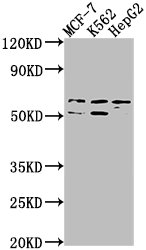USP17L3 Antibody
-
货号:CSB-PA406793LA01HU
-
规格:¥440
-
促销:
-
图片:
-
其他:
产品详情
-
产品名称:Rabbit anti-Homo sapiens (Human) USP17L3 Polyclonal antibody
-
Uniprot No.:A6NCW0
-
基因名:USP17L3
-
别名:USP17L3 antibody; USP17B antibody; USP17F antibody; Ubiquitin carboxyl-terminal hydrolase 17-like protein 3 antibody; EC 3.4.19.12 antibody; Deubiquitinating enzyme 17-like protein 3 antibody; Ubiquitin thioesterase 17-like protein 3 antibody; Ubiquitin-specific-processing protease 17-like protein 3 antibody
-
宿主:Rabbit
-
反应种属:Human
-
免疫原:Recombinant Human Ubiquitin carboxyl-terminal hydrolase 17-like protein 3 protein (19-251AA)
-
免疫原种属:Homo sapiens (Human)
-
标记方式:Non-conjugated
本页面中的产品,USP17L3 Antibody (CSB-PA406793LA01HU),的标记方式是Non-conjugated。对于USP17L3 Antibody,我们还提供其他标记。见下表:
-
克隆类型:Polyclonal
-
抗体亚型:IgG
-
纯化方式:Antigen Affinity Purified
-
浓度:It differs from different batches. Please contact us to confirm it.
-
保存缓冲液:Preservative: 0.03% Proclin 300
Constituents: 50% Glycerol, 0.01M PBS, pH 7.4 -
产品提供形式:Liquid
-
应用范围:ELISA, WB
-
推荐稀释比:
Application Recommended Dilution WB 1:500-1:2000 -
Protocols:
-
储存条件:Upon receipt, store at -20°C or -80°C. Avoid repeated freeze.
-
货期:Basically, we can dispatch the products out in 1-3 working days after receiving your orders. Delivery time maybe differs from different purchasing way or location, please kindly consult your local distributors for specific delivery time.
相关产品
靶点详情
-
功能:Deubiquitinating enzyme that removes conjugated ubiquitin from specific proteins to regulate different cellular processes that may include cell proliferation, progression through the cell cycle, apoptosis, cell migration, and the cellular response to viral infection.
-
亚细胞定位:Nucleus. Endoplasmic reticulum.
-
蛋白家族:Peptidase C19 family, USP17 subfamily
-
数据库链接:
HGNC: 37175
KEGG: hsa:645836
UniGene: Hs.741131
Most popular with customers
-
-
YWHAB Recombinant Monoclonal Antibody
Applications: ELISA, WB, IF, FC
Species Reactivity: Human, Mouse, Rat
-
Phospho-YAP1 (S127) Recombinant Monoclonal Antibody
Applications: ELISA, WB, IHC
Species Reactivity: Human
-
-
-
-
-






















